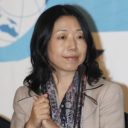Last year, the nine of us served as youth grantmakers for a youth-led fund called the Spark Fund. We had the unique experience of designing the grantmaking process and delivering financial support to youth-led and youth-focused organisations in our regions.
We were among 40 young people from 15 countries who formed four regional panels in Europe and Eurasia, South Asia, Southern Africa, and the Americas. During the process, each of the regional panels met regularly over three months. First, we got to know each other and determined our funding priorities and selection criteria. Then each panel put out a call for applications. Overall, we received an incredible response – 790 applications total, including many from organisations that had never before received grant funding!
After a lot of discussion and debate in our panels, we chose a total of 56 youth-led and youth-focused organisations in 13 countries and awarded them a total of $546,000 in flexible funding. Global Fund for Children, which established the Spark Fund with support from the Avast Foundation, facilitated the process, but we were the ones who made the decisions about who and what we wanted to fund. Here’s what the experience was like for us.
Making decisions together
More than three-quarters of the youth panellists were new to making funding decisions, though many of us were used to being on the other side – trying to find funding to support our youth groups and organisations.
As a result, the learning curve was steep, and it felt like a big responsibility to make collective decisions about which organisations and issues we wanted to fund. At times, it was challenging to come to an agreement because we all brought different life experiences to our deliberations, but that also made the process more interesting.
‘It was a tall task because the ten of us [on the Southern Africa panel] were from different backgrounds and countries,’ explained Nadia Mutisi, a Southern Africa panellist from Zimbabwe. ‘Working together required mutual understanding and a request for the opinions of others.’
Youth participation in the Spark Fund didn’t just make the grantmaking process more responsive to the needs of young people. It also provided us with valuable information and experience.
To help us make decisions, the Spark Fund gave us access to a voting platform designed by Shared Nation. Using this platform, we were able to review applications and favourite our top applicants. Then, we used pairwise voting to create a short list of finalists out of the top favourites.
The process involved a lot of passionate discussions, especially when it came time to narrow down the list of finalists to select the organisations that would ultimately receive funding.
‘The most interesting and difficult thing was during the selection of the finalists because we received many more applications than planned and each of them was relevant and interesting in its own way,’ said Rostyslav Semka, a Europe and Eurasia panellist from Ukraine.
Khalid Ahmad Tamu, a panellist from Sierra Leone, had a similar experience on the Southern Africa panel. ‘Making decisions was a complex and fun process,’ he said. ‘At one moment, someone may agree with you, and at another moment, disagree. We argued, debated, and always reached a consensus, especially in setting the criteria, selection, and voting process of awardees.’
Shared values
There were several things that helped us make decisions together. During the initial meetings, we took some time to get to know the other panellists and learn about each other’s work and the challenges young people face in our respective countries. This allowed us to understand different contexts in different countries and to identify cross-cutting issues.
‘We were open to each other’s suggestions and comments,’ Rostyslav said. ‘Because the situation in each country in our region has its own characteristics, thanks to the representation of people from each country in our region we were able to build a more inclusive approach.’
Naznine Nahar, a South Asia panellist from Bangladesh, found that mutual respect was key to successful decision-making. ‘Respect of other opinions as well as the mentality to understand different country contexts and different perspectives helped me a lot to make decisions together,’ she said.
Another strategy we employed was to agree on a set of shared values and goals early in the process. When we had disagreements later on, we were able to return to these notes to get back on track.
For youth by youth
The Spark Fund differs from traditional, adult-led philanthropy in many ways. In our selection process, for example, being young or a youth-led group wasn’t a disadvantage, but rather something the panellists shared with the prospective grantees. This allowed us to understand better the challenges youth-led groups face in different countries and to prioritize youth-led solutions.
‘The diversity of the profiles of the people that made up the [Americas] panel was fundamental, since we were not only young people from three countries, but also changemakers in different movements for a dignified life,’ said Fer Rocha Castro, an Americas panellist from Mexico. ‘The vision that was reflected in the call for applications was from a perspective of equals, of young people who have a commitment to fight and continue fighting to counteract the marginalities that our communities face.’
As youth panellists, we were able to fund organisations working on issues affecting young people, such as depression and suicide among youth, that might not be as easily understood by older grantmakers or that might be overlooked in traditional grantmaking processes.
Young people care more about the future because it belongs to them.
‘The grant decision-making was different because it was for the youth by the youth and it is important because you can only know how hot the fire is when you are in it,’ said Nyasha Yvonne Manungo, a Southern Africa panellist from Zimbabwe. ‘This means that most times adults make decisions based on their thinking, but as youth, we perceive our challenges better and have a better understanding of how they could be addressed.’
The focus on many different issues impacting young people, including climate justice, gender equity, disability rights, LGBTQ+ rights, mental health, and education. There are Spark Fund grantees supporting peacebuilding work at the border of Armenia and Azerbaijan; fighting to end period poverty in Lesotho; building climate resilience in Pakistan; and protecting Indigenous cultural identity in Mexico, just to name a few examples.
‘Youth-led decision-making is important to me because young people make up a large demographic of our population, especially here in Africa,’ said Southern Africa panellist Nadia. ‘If we do truly pride ourselves on democracy and competition, then it is vital that young people be given the opportunity to make their own decisions. Young people know their experiences first-hand and are better able to articulate and address them if they are given adequate support, hence space ought to be made to encourage more young people to make crucial decisions.’
Youth participation in the Spark Fund didn’t just make the grantmaking process more responsive to the needs of young people. It also provided us with valuable information and experience.
‘It is important to have youth-led decision-making because it grants young people an everlasting opportunity to have insight into how international bodies operate,’ explained Puseletso Mpeisa, a Southern Africa panellist from Lesotho.
Inspiration to continue the fight
Leading a grantmaking process, while challenging, was also inspiring.
It was invigorating to meet other motivated young people from our regions and to learn about the work of the many youth-led organisations that applied for funding. ‘It was an exciting opportunity to select young people who are making a real difference in their communities,’ said Sabir Ali, a South Asia panellist from Pakistan.
For Americas panellist Fer, learning about the youth-led organisations in his region that applied to the Spark Fund ‘served as inspiration to continue the organized fight.’
And for Lusine Kosakyan, a Europe and Eurasia panellist from Armenia, the Spark Fund reaffirmed her belief in the power of youth activism. ‘The whole process restored my trust in the empathy and solidarity among young people,’ she said.
Ultimately, Lusine argued, young people have the biggest stake in decisions that affect the future of our communities. ‘Young people care more about the future because it belongs to them,’ she said.
Launching youth-led grantmaking
Nasra Ayub, a Programs Associate at Global Fund for Children (GFC) who worked closely on the Spark Fund, shared some recommendations for other funders interested in creating similar initiatives.
When the Covid-19 pandemic began, she explained, GFC noticed an increase in the number of youth at the forefront of tackling social justice issues, but saw limited resources and funding disbursed to youth civil society. ‘We also noticed that youth voices were missing from the decision-making process in philanthropy,’ she said. ‘The Spark Fund was designed to try and address some of the issues by backing youth leaders to take risks and have a voice in decision-making.’
If we do truly pride ourselves on democracy and competition, then it is vital that young people be given the opportunity to make their own decisions.
Through the process of supporting the Spark Fund, Nasra learned that it was ‘essential to be adaptable’ and flexible. ‘We reminded ourselves of the fact that it is a pilot, therefore some things will go right, and some will not, but it is all part of the learning process,’ she said.
Nasra recommended that organisations creating similar initiatives obtain strategic buy-in and sign-off from any other funders or partners involved in the project before launching the youth panels. In GFC’s case, she said, ‘this ensured we were able to shift decision-making power to our panels.’
Another key step, Nasra added, is to recognize that young people do not need to have experience in grantmaking to participate in funding decisions ‘as their lived experience and grassroots work is valuable.’ As an example, she shared that 80 per cent of the Southern Africa panellists had never before participated in grantmaking decisions, ‘yet their expertise and dedication resulted in the selection of 16 incredible partners across Southern Africa.’
Invest in youth
For us, the Spark Fund proved that youth can lead successful grantmaking processes and make important funding decisions. We’re excited to see what happens in the next Spark Fund rounds, which will focus on youth-led climate action and mental health.
We call on other funders to adopt youth-led participatory grantmaking models so young people have more opportunities to shape funding decisions and fuel social justice efforts.
This piece was written collaboratively by Sabir Ali, Lusine Kosakyan, Nyasha Yvonne Manungo, Puseletso Mpeisa, Nadia Mutisi, Naznine Nahar, Fer Rocha Castro, Rostyslav Semka, and Khalid Ahmad Tamu – members of the Spark Fund.






Comments (0)
Fantastic writing! Never miss an opportunity to read the featured articles in this magazine!
There is a strong emphasis on various concerns affecting the youth, such as climate justice, equal treatment for all genders, rights for individuals with disabilities, LGBTQ+ rights, mental well-being, and education.
Perhaps philanthropy in Asia is undergoing a profound cultural change driven by generational differences.
You are safe with us and our Swasthya Vihar Call Girls and no matter any number of times you avail our services, you are in safest zone committed completely to please you. We also value your hard earned funds and consequently have deliberately have marked cheap services despite of high degree of excellence and high profile services
the Spark Fund's success demonstrates that youth-led grantmaking can be effective, inclusive, and impactful